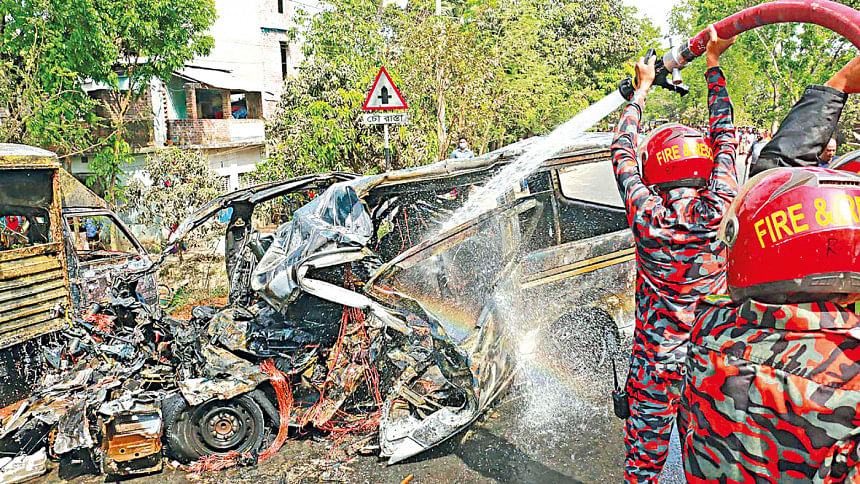Urgency of compulsory motor vehicles insurance in Bangladesh

In Bangladesh, owners of motor vehicles need to take insurance policy that expires in one year as a non-life policy that costs different amount for different types of vehicles. As per the provisions enunciated in the Motor Vehicles Ordinance, 1983 (hereinafter referred to as the MVO, 1983) taking a motor vehicle insurance was mandatory for the owners of motor vehicles except for the ones owned by the government. The newly enacted Road Transport Act, 2018 has made it optional for the owners to take insurance policy. Therefore, at present, there is no statutory obligation for the owners to take insurance policy and as a result, they can run their vehicles without any insurance policy as such. Circulars issued by the Bangladesh Road Transport Authority (BRTA) and Insurance Development and Regulatory Authority (IDRA) in reference to the new Act of 2018 instructed the concerned authorities to curb the practice of issuing and verifying obligatory insurance certificates.
As per the provision of section 60 of the new Act, transport owners can ensure the passengers if they "wish" to do so. Also, the Act is silent about the insurance of the drivers and other staff members. Even in various sections on insurance incorporated in the new Act, the issues regarding conditions, limitations of liability, mitigation of claims, validity and transferability of insurance certificate etc. of motor vehicle insurance are not made clear. These issues have rather been kept to be enunciated in details by Rules yet to be made.
Now a vital question is - who will bear the compensation? Innocent passengers and sometimes strangers e.g. passers-by may be found as third-party victims as consequence of a road accident. In Bangladesh, motor vehicle owners' liability has been recognised by the higher judiciary as a form of tortious liability arising out of actions or inactions of persons working under them e.g. drivers. The Act of 2018 directly holds the drivers responsible in this connection, while exempting transport owners from shouldering liabilities. In addition, compensation for emotional injury is granted by the higher judiciary of the country and that may sometimes rise up to a huge amount, on different heads, which may or may not be possible for the drivers to pay.
In the past, two policies were in place - act liability (basic) and comprehensive. Most of the owners used to take act liability obligatory insurance certificates from government or non-government insurance companies only for complying with the law. Since 1983, the owners have been paying the amount for vehicle insurance, but hardly had they received any amount as claimed compensation from the insurance companies; hence so far, it almost looked like a one-party contribution. Some of the owners however took comprehensive insurance policy which has limited liability as per contract. In Catherine Masud v Kashed Mia and others [reported in 67 DLR 527], the owner of the vehicle had a comprehensive insurance policy with Reliance Insurance Company. In that case, an issue was raised as to whether the insurer had any liability to pay compensation beyond the limit, which was a demand of the party to the case under indemnity clause of the policy as admitted by the insurer, and if so to what extent? The Court however could not impose more liability because the parties to the insurance policy had a contract with fixed liability that was limited in amount and already paid by the insurance company.
In the MVO, 1983 Chapter IX under the heading of insurance of motor vehicles against third party risks contained a provision of application to be made within 6 months from the date of an accident. It had to be made to the assigned Tribunal under section 128 of MVO, 1983 having jurisdiction over the area in which the accident occurred.
After the repeal of the MVO, 1983 it appears at present that the victims of road accidents do not have access to any special judicial fora to make demand for compensation as the newly enacted Act provides for no such remedy rather prescribes to take resort to the general criminal justice mechanism.
It is pertinent to note that the draft Road Transport Act, 2018 had provided that the transport owners, companies, operators or their representatives must bear the treatment costs of the injured victims. But the finally passed Act does not make anyone of them liable as such. It transpires that the new law is soft on the transport owners and leaves the matter of taking insurance policy to the sweet will of them.
The new Act proposes that the government will raise a fund for the injured and family members of the dead, to be overseen by a trustee board with representatives from different government agencies and other stakeholders such as highway police, transport owners and workers' associations etc. The funds will be raised with taxpayers' money and contribution from transport owners and workers as well as from a portion of fines to be realised from traffic offenders. However, it is, at best, an alternative way but can never be as apt as compulsory insurance.
As the mandatory insurance policy provision is omitted in the new Act, now the ultimate question to answer is - to what extent owners will be interested to take insurance policies to cover probable risks. Therefore, it is necessary to make a provision regarding mandatory insurance policy which has to be designed in such a way that covers the maximum risk of financial liability. Formulation of a comprehensive policy with provisions for compulsory motor vehicle insurance with a fixed mandated standard premium covering both property and physical damage is a crying need. Only then, can the highest standard road safety be ensured in Bangladesh.
The writer is Professor, Department of Law, Rajshahi University.

 For all latest news, follow The Daily Star's Google News channel.
For all latest news, follow The Daily Star's Google News channel. 



Comments